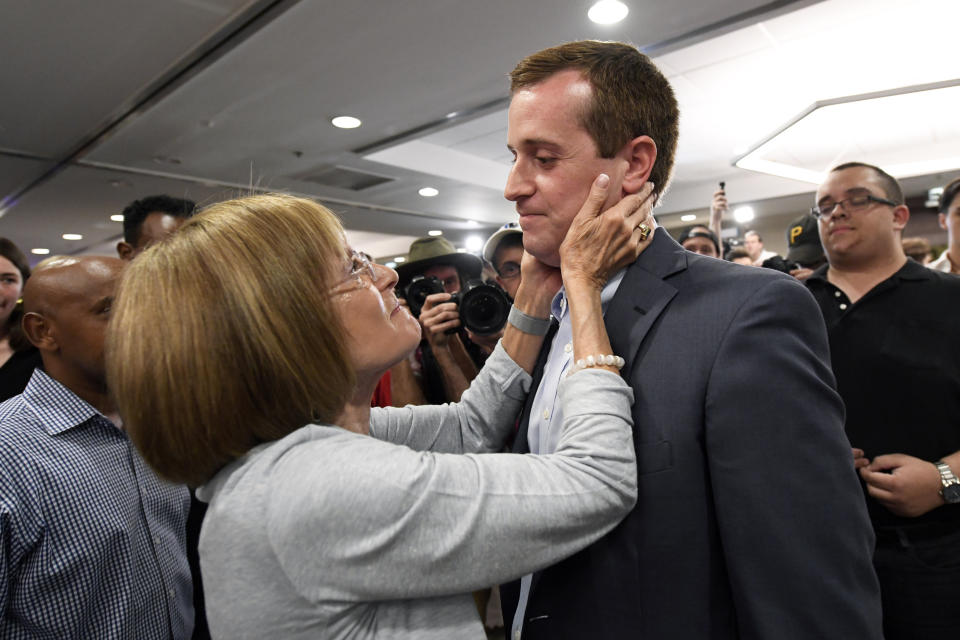2020 Vision Wednesday: The special election in N.C. sends a warning to both parties

Welcome to 2020 Vision, the Yahoo News column covering the presidential race with one smart, fast takeaway every weekday and a deeper roundup every weekend. Reminder: There are 145 days until the Iowa caucuses and 419 days until the 2020 election.
The headline from Tuesday’s do-over U.S. House election in North Carolina’s Ninth Congressional district was that Republican Dan Bishop held onto the seat for the GOP in a narrow victory over Democrat Dan McCready.
But the headlines didn’t quite capture the real story. For that, you have to dig into the results in Robeson and Mecklenburg Counties, which constitute a cautionary tale for both Republicans and Democrats heading into 2020.
NC-09 is perhaps the perfect place to look for a 2020 preview. A longtime Republican stronghold, it nearly flipped in the Democratic wave of 2018, when the Republican candidate won by fewer than 1,000 votes — a result that was thrown out due to overwhelming evidence of ballot fraud by the GOP campaign.
Snaking along North Carolina’s southern border, the district starts off very suburban, just east of Charlotte, and winds up very rural, over near Fayetteville.
In the suburbs — basically, Mecklenburg County, where educated, relatively affluent Charlotte commuters are concentrated — McCready overperformed. Last time around, in 2018, he won the county by 9.5 percent. This time he did even better, trouncing Bishop by 12.6 percent. Worth noting: Bishop, a state senator, is from Mecklenburg and has represented the area in various offices since 2009.
In the rural areas, however — places like Robeson, a majority-minority county where members of the Lumbee Native American tribe make up a plurality of the population — it was Bishop who beat expectations.
Robeson, it turns out, is a hotbed of Obama-Trump voters. Barack Obama won the county twice, by nearly 14 percentage points in 2008 and nearly 17 points in 2012. But Trump flipped it four years later, edging out Hillary Clinton by 4.
So what happened Tuesday? Well, McCready won Robeson, but his margin of victory fell to 1.1 percent, from 15.3 in the disputed 2018 election.
That 14.2-point plunge should stress Democrats out.

If you’re only factoring the 2020 House elections into the equation, Tuesday’s results were actually encouraging for Democrats. Trump won the district by 12 points in 2016, so for Dems to come within 2 points this year represents at least a moral victory. The drop-off in Trump’s approval among traditionally Republican suburbanites, women in particular, propelled the party to 40 House pickups in 2018, and if NC-09 is anything to go by, anti-Trump sentiment in the places like Mecklenburg County should fuel further House flips in 2020. According to the Cook Political Report’s Partisan Voting Index, there are 35 GOP-held House seats up for grabs next year that lean less Republican than NC-09.
The problem for Democrats is that their gains in America’s Mecklenburg Counties seem to be offset by losses in America’s Robeson Counties — and while suburban strength can win a geographically circumscribed House district, it’s tough to win an entire state while the GOP is running up the score in the rural areas. (Remember: That’s why Democrats lost Senate seats in 2018, even as they won back the House.)
What Tuesday showed is that when Trump is on the ballot — either officially, as in 2016, or in spirit, as in a standalone, big-money special election where he holds a campaign rally in the final days — rural voters turn out for the GOP.
If Democrats can’t figure out how to fight back — perhaps by nominating a standard bearer who, like Obama, energizes black voters without totally turning off non-coastal America — winning in 2020 is going to be a lot harder than some in the party have let themselves believe.
Download the Yahoo News app to customize your experience.
Read more from Yahoo News:





